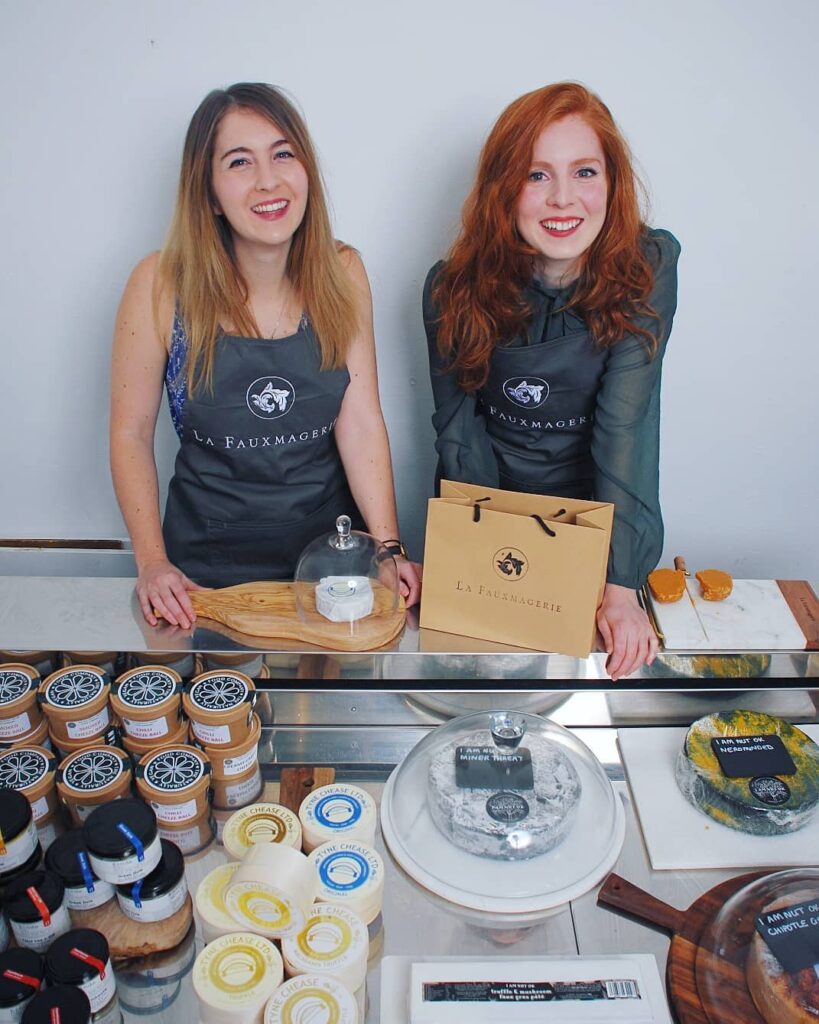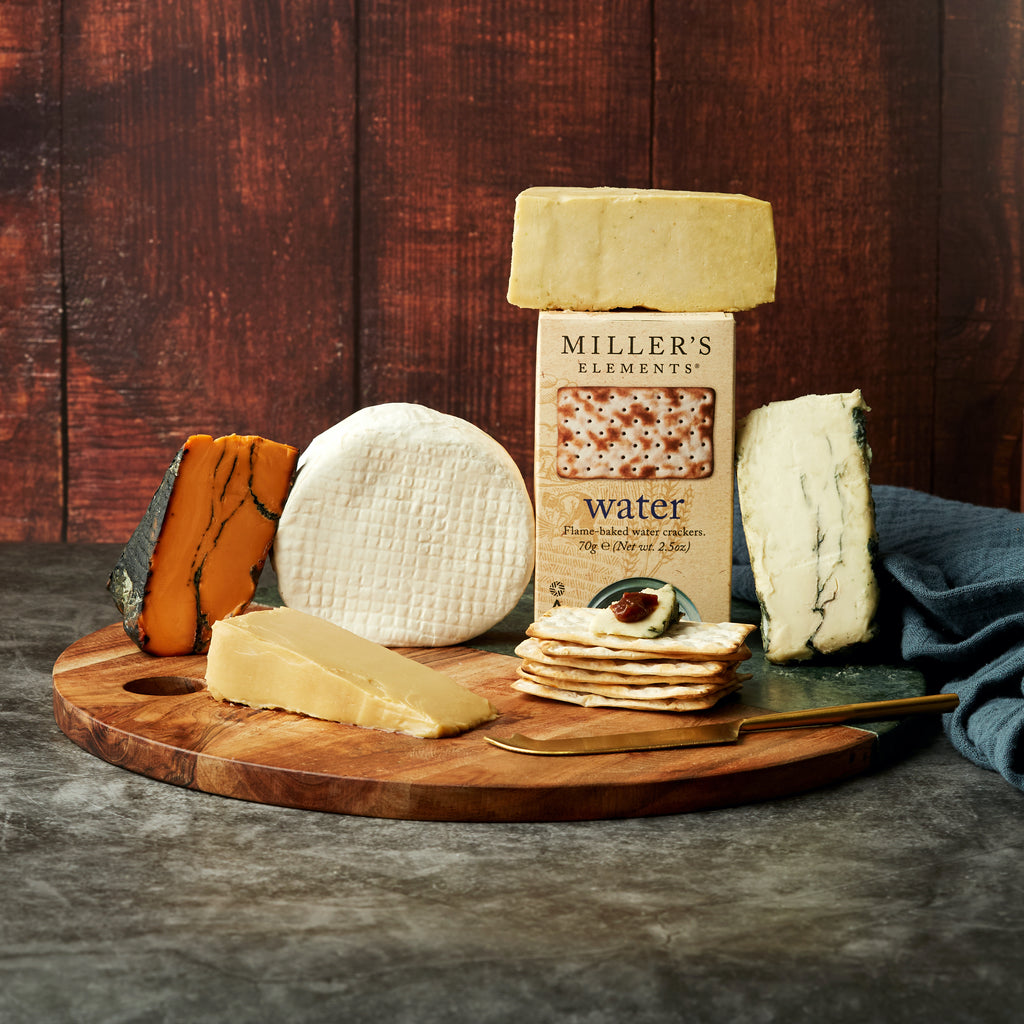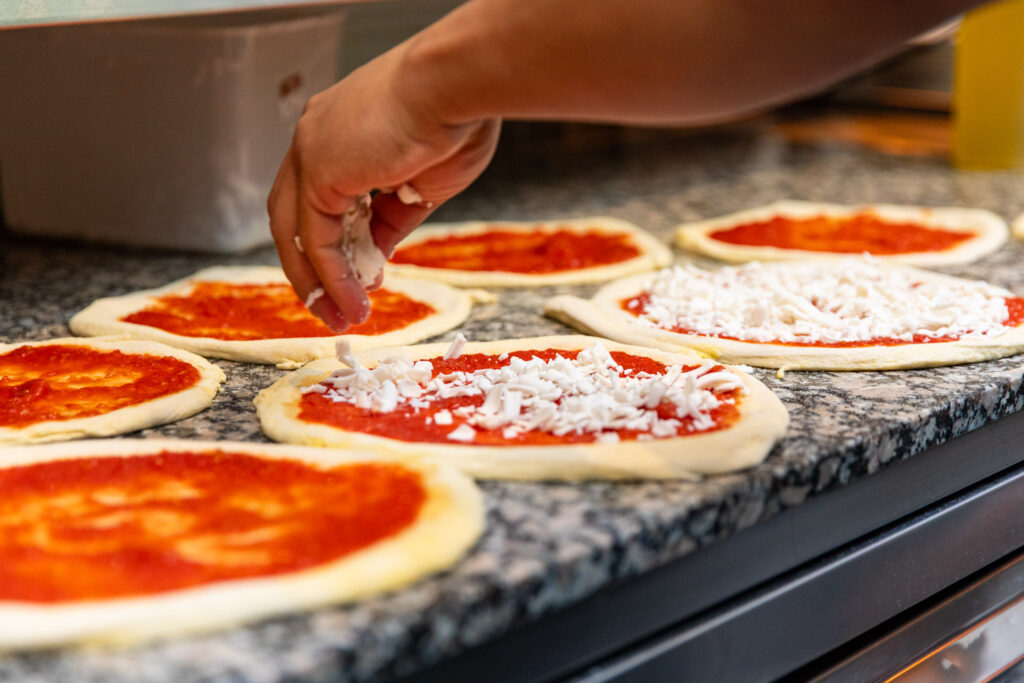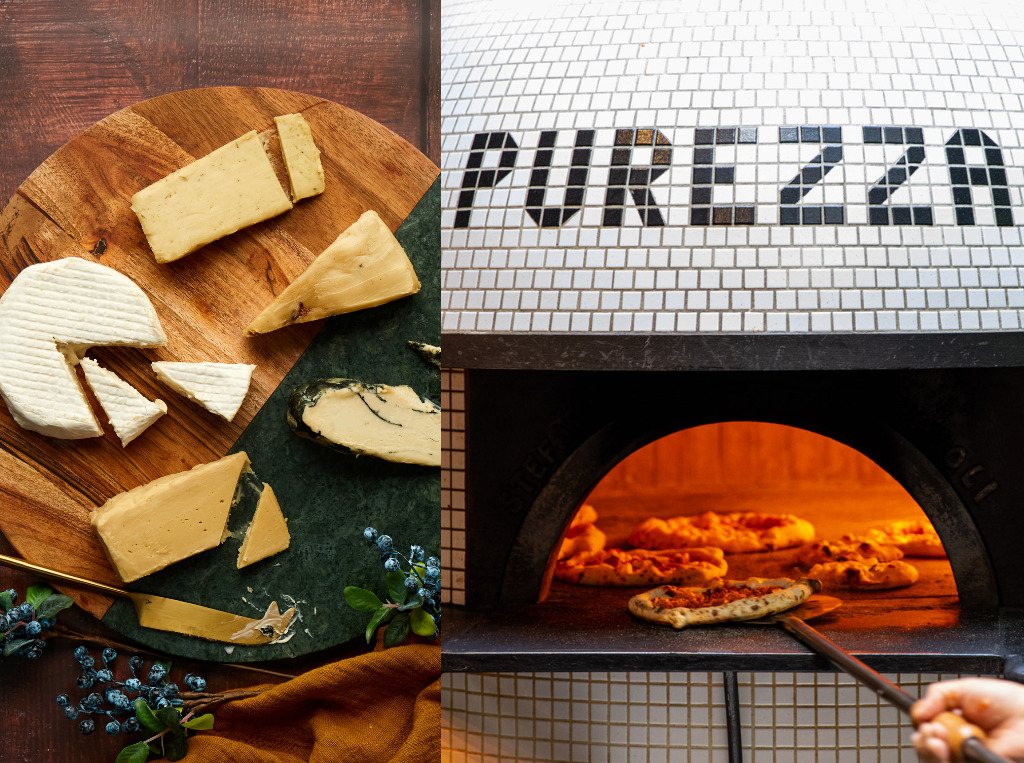Plant-Based Fro-Merger: UK Pizza Chain Purezza Merges with Artisan Vegan Cheesemonger La Fauxmagerie
6 Mins Read
UK vegan pizzeria Purezza has acquired a majority stake in London-based vegan cheesemonger La Fauxmagerie in a merger, with the former looking after the plant-based cheese brand’s sales. Purezza head of sales Mitch Lee speaks to Green Queen about consumer priorities and the vegan cheese market in the UK.
Purezza has acquired a majority stake in La Fauxmagerie, the plant-based cheese brand founded by sisters Rachel and Charlotte Stevens in 2019. As part of the merger, the pizza chain will manage the vegan cheesemonger’s sales, while “expanded collaborations” are also expected.
Purezza founder Tim Barclay confirmed that La Fauxmagerie’s physical retail location in Shoreditch, east London will remain open and continue to sell cheeses by both brands, in addition to products from other artisanal vegan cheese makers like I Am Nut OK, Kinda Co. and Palace Culture.
Barclay kept details under wraps when asked about any potential rebrands, the use of La Fauxmagerie’s cheeses on Purezza’s menu (the restaurant tends to avoid nuts where possible for allergen purposes), or future R&D processes. “At the moment, everything will continue as is,” he offered.
A vegan cheese bloc

“At Purezza’s core, we want to be able to offer foodie vegans, vegetarians, and even those with no dietary requirements an alternative that doesn’t compromise on quality, flavour and dining excellence and La Fauxmagerie is passionate to achieve the same goals,” said Purezza co-founder Stefania Evangelisti. “It’s a perfect match in our eyes.”
La Fauxmagerie’s Charlotte Stevens added: “We’re so excited to be joining the Purezza family who, in addition to being female-led, share our mission to increase accessibility to high-quality, plant-based products.”
Purezza was founded in 2015 and currently has restaurants in Brighton, London, and Manchester. It has previously raised £2.4M in funding and was named the UK’s Best Vegan Restaurant in 2019 by Vegfest. In addition, the pizzeria has won several awards for its food, including at the World Pizza Championships in 2019, and makes its own rice-based alternatives to mozzarella and stracciatella.

La Fauxmagerie – which secured a £2M investment earlier this year – is the first fully vegan cheesemonger in the UK, selling gourmet plant-based cheeses from a host of British brands, plus vegan wine and charcuterie items. It has a cheese cellar that hosts cheese and wine pairings, featuring offerings from other brands as well as its own portfolio, which includes the likes of Truffle Camemvert, Balham Blue, and Shoreditch Smoked. Last year, it gained a listing in UK supermarket Waitrose.
Following the announcement of the merger, the two brands will appear side-by-side for the first time at this week’s Plant Based World Expo event in London (November 15-16).
Taste and price key for British vegan cheese
The merger comes at a curious time for cheese consumption in the UK. Government data shows that while the intake of dairy (excluding cheese) was at its lowest in 2022 since records began, and cheese consumption declined by 10% year-on-year, Brits have been eating more cheese in the last two years than they have ever done. As for vegan cheese, analysis from alt-protein think tank the Good Food Institute (GFI) Europe revealed that sales fell by 12% from 2021-22, reflective of the overall plant-based sector’s 3% decline.
“Right now we’re in a cost-of-living crisis, so people are being more selective on where and how they spend their money,” said Purezza marketing manager Mitch Lee. “Plant-based cheese is an area that still is only just getting going when it comes to taste, texture and quality.”

Linus Pardoe, GFI Europe’s UK policy manager, told Green Queen last month: “Ultimately, most people’s food choices are driven by three main things – taste, price and convenience. Particularly during the UK’s current cost-of-living crisis, consumers will be looking very closely at products’ price tags before deciding whether or not to put them in their shopping basket.”
A UK-wide 759-person survey by ProVeg International last year found that even if the taste and texture of vegan cheese were identical to dairy-based counterparts, only 22% of Brits were likely to eat the plant-based versions over conventional. Additionally, only 15% are likely to pay more for vegan cheese, despite them having a similar flavour and texture.
As Purezza and La Fauxmagerie both make artisanal cheese, their products are priced on the higher end. For example, the latter’s almond- and coconut-based Smoked Shoreditch retails at £4.50 for 100g in Waitrose, whereas its almond-shea Truffle Camemvert is priced at £6 for 160g (it must be noted that truffle-flavoured foods will always be more expensive). In contrast, plant-based giant Violife’s coconut-oil-based Smoky Cheddar slices cost £2.95 for 200g, while its Le Rond Camembert sets you back £3.40 for 150g at the same retailer.

“The cheaper, more readily available products make for nice swaps for vegans,” acknowledges Lee. “However, they often miss the mark for non-vegans who can’t get on board the taste, texture or smell.” If you compare La Fauxmagerie’s cheeses to conventional gourmet cheese, the comparison feels more even. For example, Tunworth’s camembert is priced at £8.50 for a 250g wheel, which is only marginally cheaper gram-for-gram than the former’s vegan alternative.
“Taste is by far the most important thing to focus on, closely followed by texture or application (for example, does a mozzarella really melt?),” suggests Lee. “With plant-based cheeses, the brands who are doing it well are often artisanal, handmade, aged, and use higher-quality ingredients. This makes the texture far better, but also means the cost will be higher.”
The health aspect and market optimism
The other factor consumers are increasingly concerned about is health, and subsequently cleaner labels. In 2020, a global survey by Ingredion revealed that over half of respondents find it important for products to have a short ingredient list. The ingredients manufacturer’s latest data has additionally found that 78% would spend more money on products with ‘natural’ or ‘all-natural’ packaging claims.
As for the UK, Mintel data from 2019 found that 46% of UK Brits feel ‘clean label’ means ‘good for you’, and 24% believe it means the product is highly nutritious. Purezza’s cheeses don’t necessarily fit the clean-label bill, with ingredients like locust bean gum, sodium citrate and dextrose – instead, they double down on the application factor, designed to give you the best vegan pizza possible.
That caters to the people prioritising taste over other things. But its merger with La Fauxmagerie expands its target consumers, with the latter’s nut-based cheeses containing shorter ingredient lists with elements that can usually be found in home kitchens (like miso, nutritional yeast, and mustard powder, to name a few).

Despite the dip in UK vegan sales, Lee remains optimistic about the market. “You just have to look at brands like Better Nature tempeh and Bold Bean Co to see the demand for plant-based products isn’t slowing down,” he says.
“Plant-based cheese is an area that I see big things for in 2024 – Purezza and La Fauxmagerie aside, you just have to see what other fantastic producers like Honestly Tasty, I Am Nut OK, Kinda Co., Palace Culture and many more are doing to push the needle in this arena. The movement is bigger than one brand,” he adds. “So many non-vegans will say: ‘I could go vegan, but I love cheese too much’ – and this is because if they’ve tried vegan cheese, it hasn’t been received very well. We all need to celebrate each other’s wins with new listings and increased access for consumers.”



